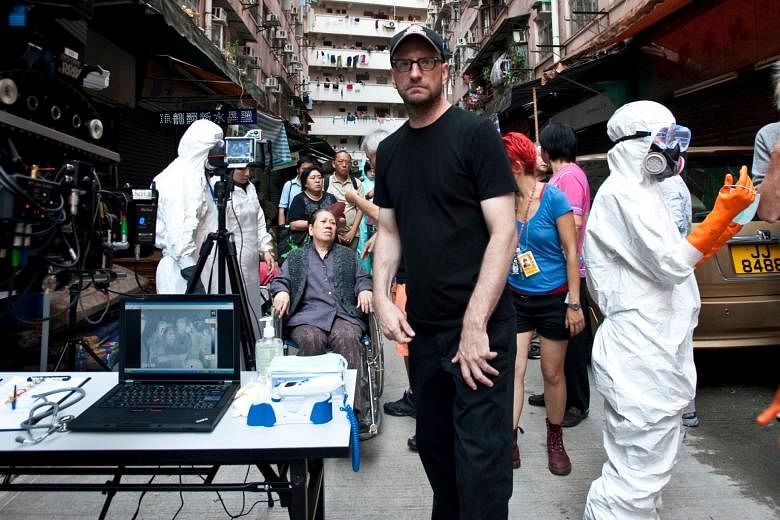LOS ANGELES • A funny thing happened to American directors Steven Soderbergh and Amy Seimetz in lockdown, as two of their movies found new resonance during the Covid-19 era.
Contagion, Soderbergh's 2011 pandemic thriller starring Matt Damon, rocketed up the iTunes rental charts in March.
Seimetz's new film She Dies Tomorrow, which came out last Friday in drive-ins and this week on digital, offers a more subjective take on going viral. An anxious young woman is convinced she will die the next day, and anyone she tells is soon gripped by the same fearful prophecy.
"Contagion is relentlessly objective in its style and its formal structure whereas Amy's film, by design, is this sort of fever dream in both its style and its storytelling," Soderbergh said recently during a pandemic-focused Zoom call with Seimetz.
These are edited excerpts from the conversation.
What were the first few months of lockdown like for both of you?
Soderbergh: I knew in January from talking to my friends in the world of epidemiology that this was serious.
I would call them and say, "So what do you think?", and their entire quote was: "It's going to be bad."
But you're trying to balance these very conflicting, primal reactions to what's happening with the virus and your own career advancement, so it's a really strange collision of your civic duty and your ego.
Seimetz: Another thing that's evolved is my conversations with executives. At the beginning of this, they were, like, "We're not in the office anymore, so we're just going to call you all the time and ask when things will be ready."
It's been interesting to see how those calls all dropped off in silence, which I prefer because it allows me to do the work.
What did you make of all the people who were drawn to Contagion during the early days of the pandemic?
Soderbergh: It does pose a larger question about why we've had this attraction to disaster movies.
Why is this kind of imagery, this spectacle of destruction, so compelling to us? Is it pure fantasy or is it something darker that's wound into us?
Seimetz: I have a theory about that because I actually witnessed myself doing this.
When the pandemic started, in order to not feel anxious, I was binge-watching completely mindless cr** like Too Hot To Handle and Love Is Blind and I was, like, "Why do I feel so ill after? I'm just trying to take my mind off things".
And then I was, like, "I'll watch After Life, with Ricky Gervais", and I was just sobbing the entire time, but I felt so much better.
I needed to feel those emotions, like loss, sadness and fear. I think suppressing them sort of makes you more anxious, so there's a cathartic element to watching something like Contagion, which I found strangely comforting.
Is there anything happening now that you did not foresee when making the film?
Soderbergh: What I couldn't have predicted was the fracturing of society that it would generate, and all of the things it would expose when the tide goes out, so to speak.
I didn't anticipate that it would reveal so starkly the sort of economic disparity we're aware of intellectually, but that a lot of us are able to insulate ourselves from being directly affected by. Now, nobody escapes this. There are very few people whose lives will not be completely altered by Covid-19.
Amy's film is more about that psychological toll and how quickly anxiety can become contagious itself.
Seimetz: The tricky thing about anxiety is sharing that you have it can make other people anxious, and there's a feeling that you're burdening them by doing so.
Your anxiety then becomes their anxiety, in a way that's very literal in this movie.
It's happened with the news cycle too. I found myself becoming completely addicted to the news, getting anxious from it and then compulsively watching it more. So it's also about news cycles spreading panic and the addiction to panic.
Steven, you are heading a Directors Guild committee to figure out how to get Hollywood back to work safely. What are the problems you are facing?
Soderbergh: I think the biggest issue now is because of the resurgence (of the virus), how do we get access to the resources and the personnel we need to run these protocols to keep a set safe?
It's one thing to do one or two projects and see how it goes, but there's a movement in the last two or three weeks to get lots of productions back up and running at the same time. That's going to be tricky.
NYTIMES

